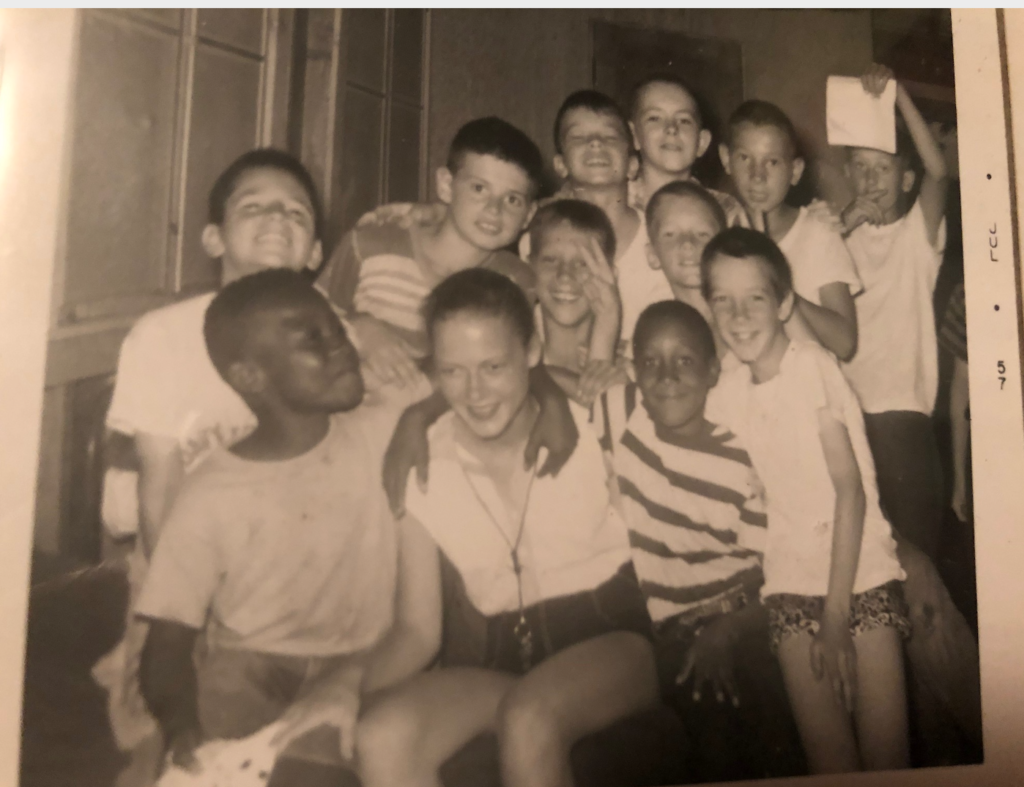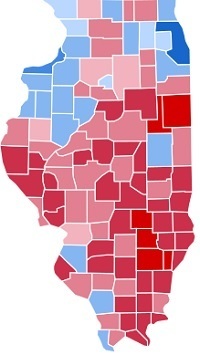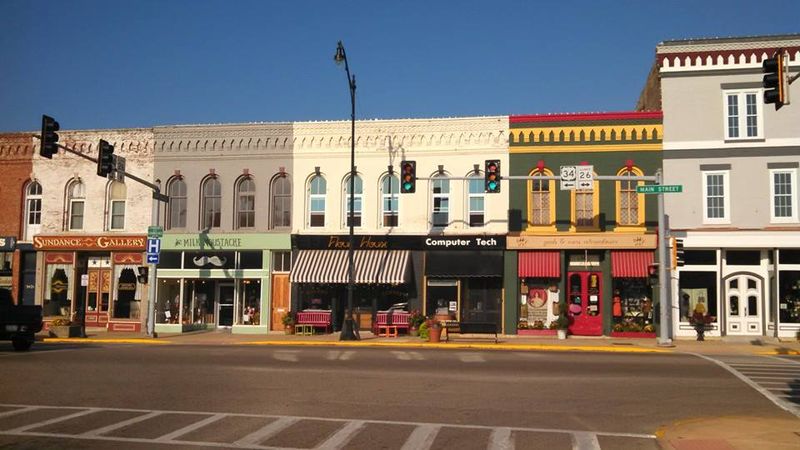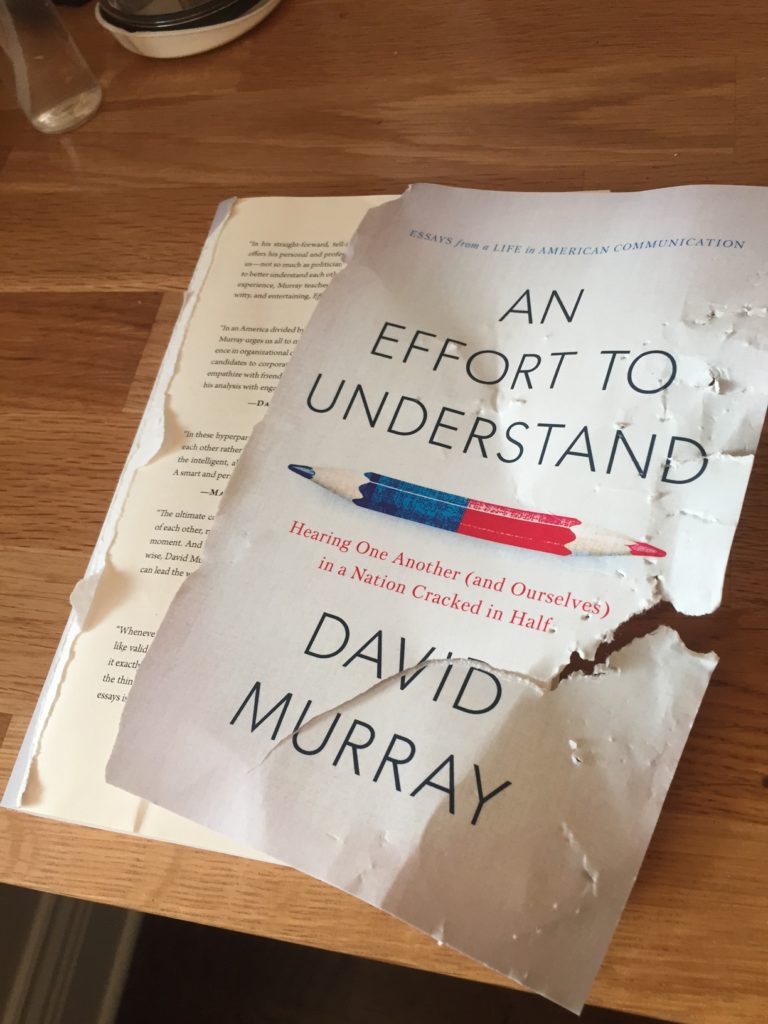When you check into any mental health facility, they put you through something they call the “intake assessment,” where you list your mental health history, as factually as you can, so all the staffers you’ll deal with there have a common set of facts to work from.
After the horror of George Floyd and the screaming American aftermath, I was feeling a little crazy myself. So a started to do an “intake” of my own. A race intake.
I’ve always had this feeling that well-meaning Americans like me think it’s mostly Black Americans who have had traumatic and confusing experiences, and white Americans who should sympathize and trouble-shoot, from a position of relative orderly calm.
But I think growing up white in America drives you to a kind of madness—easy to conceal by changing the subject and discouraging others from “focusing on race.” And I think accounting for it and copping to it is one step down the road toward being able to see white supremacy as something more subtle than hoods and swastika tattoos.
Or something like that.
I sent this to a Black friend awhile back. She asked me what was the point. Beyond what I’ve drunkenly slurred above, I didn’t know, and I don’t still.
White reader, Black reader, maybe you can help.
***
The first Black person I ever met was in kindergarten. And I was confused, because his name was Chuck Green.
There was a famous TV show about Daniel Boone, popular in reruns when I was maybe in first grade. I don’t remember the words to the theme song, only to a parody that kids my age—six years old—would sing: “Daniel Boone was a man, yes a big man. But the bear was bigger, so he ran like a n— up a tree.” (Did they—we?—know not to sing that around Chuck?)
The next Black person I remember meeting was Angela Clark, who was the only Black kid in my class of approximately 270 kids who matriculated through the public schools of the white upper-middle class town of Hudson, Ohio. I know not one more thing about Angela beyond what I have just said, aside from that she was … quiet?
[Hudson, Ohio, was once home to the abolitionist John Brown, and also a stop on the Underground Railroad. When I grew up there in the 1970s, there were more plaques than Blacks. My mother wrote in a literary journal that she wanted to move at one point, because “the only blacks the kids see here are on television.”]
The mechanics at the Marathon station on Main Street were Black—Everett and Coleman. My dad too-frequently described them as “good friends of mine.” I can’t remember if I overheard my mother calling him out on the statement, or if I just sensed her skepticism.
She was 15 years younger, and had dated a Black man in the late 50s or early 60s, in Detroit; he was arrested on a trumped-up jaywalking charge, for being with her, she said. She considered herself—especially in opposition to my comparatively old-fashioned Republican dad—a progressive on these issues. This photograph, from her time as a high school camp counselor in 1957, made her scrapbook.

And in 1964, working as a copywriter at an ad agency, she wrote a newspaper ad. “If you feel sure civil rights is moving fast enough,” began the headline over a grainy black-and-white photograph of a racially ambiguous child in a crib, “try to imagine your children waking up Negro tomorrow morning.”
Dad grew up in the twenties and thirties in the very southern, southern Ohio town of Middletown. He told us stories about an all-day cleaning woman/cook named Mamie, who would fix him sandwiches to eat when he ran a block home from Lincoln Elementary. She would also make the family dinner in the evenings, before going home to presumably make dinner for her own. Dad spoke of her fondly, in the same tone he used when he talked about Everett and Coleman.
Dad’s younger brother David, my uncle after whom I was named, employed a similarly versatile servant named Esterleen, starting in the 1950s and lasting until at least 2000 (!).
“Leen,” as she was called, was wonderfully friendly to us kids whenever we were down there—friendly in a super-smiley way that no white person had ever been friendly to us. She cooked for us on holidays, and we had only passing thoughts about what her own family was doing for dinner on those nights, and whether they missed having her there. She would take a break from her cleaning chores every afternoon, and watch one or more soap operas with my Aunt Zodie—and a lot was made of that. Anyway, David and Zodie always called her “family,” and took pride that they paid her to cook for special events even when she was well past her prime.
(We weren’t in Middletown all that much, but Esterleen sure is vivid, and I am astonished to be old enough to be able to tell you this antebellum-sounding tale in the first person.)
Uncle David told me that when he was a kid in the 40s, the public swimming pool on the Black side of town was called “the ink well.” He added, “Terrible!”
I don’t know what age I was when my dad first shared his theory that there was nothing inferior or superior about black people or white people, but that each just had a visceral, perhaps natural disgust toward the other race. There was no disparagement of Black people in our house, but my younger sister did remind me of our shock one day in the car when Dad got mad at a Black motorist and shouted (not so the man could hear), “You … monkey’s uncle!”
Dad loved “The Cosby Show,” though his ad agency had hired Bill for some commercials and he was supposedly a big asshole to work with.
After an almost perfect Republican voting record beginning with Thomas Dewey, Dad, then sick with pancreatic cancer, voted for Barack Obama for president, and cried in disbelief afterward that he had lived long enough to vote for a Black man for president. Just barely. He did not live to see the inauguration.
In college, I saw Do the Right Thing. It was stranger to me than Alien.
Soon after I moved to Chicago, I rode the Lake Street El past the hulking, dismal Henry Horner Homes public housing projects, while reading the book about life there, Alex Kotlowitz’s There Are No Children Here. It seemed to me that I was looking directly at the biggest problem in America.
At my first job, in the early 1990s, two Black employees—they were actual sisters—marched into the CEO’s office one day in January and said loudly enough that people outside the office could hear, “Hey, how about you make Martin Luther King Day a company holiday and give everybody the day off?” Startled, he said, “Okay?” And from then on, we had MLK Day off.
Someone closely connected with a Chicago police detective in Black neighborhoods told me that the police routinely beat confessions out of suspects with phone books because they don’t leave marks, and because the police’s attitude was, “They’re going to say we beat ‘em anyway, so we might as well.”
In our late twenties, my wife went to work as a school teacher on the West Side of Chicago, and started bringing poor Black kids home, to sleep in our house when there was too much trouble in theirs. I went along with this, despite extreme and not fully understood discomfort and resentment. I took a special interest in one of the kids, a sweet and handsome teenage artist named Bryant. He liked to drive around in the decrepit, roofless truck I had at the time, because he liked to admire himself in the big side mirrors.
One day as we rattled down Division Street, Bryant casually asked me why I drove such an unreliable bucket of bolts when I didn’t have to. I said I liked the adventure of it—because you just never knew what was going to happen!
“Dave?” he said, cautiously.
“Yes, Bryant?”
“Sometimes, I think white people don’t have enough problems.”
***
What my Black friend actually wrote in response was, “What does this mean? What do you want us to take away from this? I can see the tangled history with race. But what have you discovered? What has that tangled history left you with? What would you like us to do with this, become because of it, learn from it?”
No. It’s not a teaching document. It’s a learning document, for me, and for anyone who knows me. If it moved you to do an intake of your own, on paper or in your head, I think that would be terrific. But that, too, would be mostly for you.
But to Bryant’s question of two decades ago: I think white people have plenty of problems—especially those of us who want to get to the end of our lives having become (let alone having raised) saner citizens of this insane nation that we love, nevertheless.



